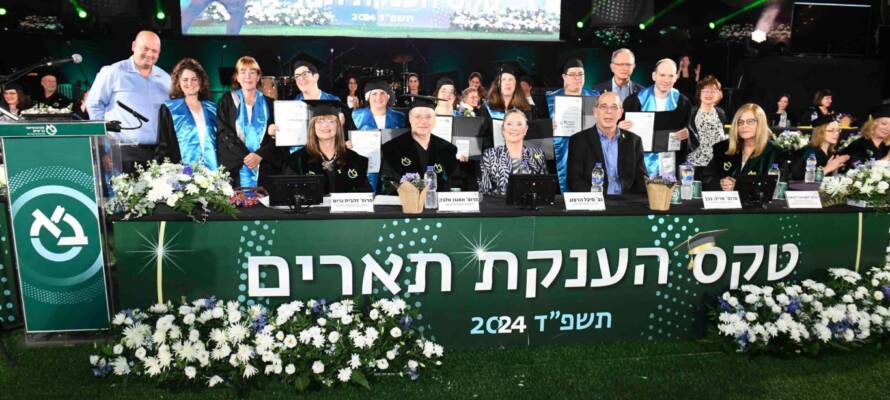They all received diplomas for Multidisciplinary B.A. in Social Sciences at the Faculty of Education’s graduation ceremony at the university’s campus in Ramat Gan.
By Amelie Botbol, JNS
Six students made history this week by becoming the first-ever Israeli cohort with intellectual disabilities to earn bachelor’s degrees.
“Amid this joy over the completion of your degree and the beginning of the journey for all of you here at this wonderful faculty, I want to thank six wonderful people, the graduates of the Empowerment Project,” said Israel’s first lady Michal Herzog, who attended their graduation ceremony.
“I am here today thanks to Ruti, Tomer, Hofit, Henia, Oded and Lior—six exemplary people with cognitive versatility who are full of courage, determination and a great soul,” she said.
The graduates, Ruti Bar-Or, 46, from Jerusalem; Tomer Gad-Barak, 35, from Petach Tikvah; Hofit Gilad, 41, from Ramat Gan; Henia Greengarten, 42, from Kfar Saba; Oded Naftali, 34, from Rishon Letzion; and Lior Shmualevitz, 35, from Hod Hasharon, had enrolled in the Empowerment Project at Bar-Ilan University’s Faculty of Education.
On Wednesday, they all received diplomas for Multidisciplinary B.A.’s in Social Sciences at the Faculty of Education’s graduation ceremony at the university’s campus in Ramat Gan.
“For me, completing this degree is a huge honor,” Naftali, who has Down Syndrome, told JNS.
“My message is: ‘All shy people can learn.’ This project allowed me to overcome my timidity and gain confidence. I managed to learn better. During exams, I would use elimination to find out the right answers,” he added.
The Empowerment Project, established by Professor Hefziba Lifshitz, is based on her Compensation Age Theory, which argues that chronological age, as opposed to mental age, plays an important role in determining the cognitive ability of adults with intellectual disability.
“We identified uniquely high capabilities in these six students, linguistically and in terms of comprehension and memory,” Lifshitz told JNS on Wednesday.
Lifshitz knew there had already been three people in the world with intellectual disability who had completed bachelor’s degrees. She tried to find study content but couldn’t so she decided to build her own model, step by step.
“Our students started by attending two courses and it became clear that their experience in life, their maturity, and their experience with education and welfare systems was an asset,” Lifshitz said.
“The students were monitored by academic facilitators who graduated from the M.A. program in intellectual disability and were approved by us,” she continued.
“For every academic hour they spent learning in class they received one-and-a-half hours of assisted learning so that they would be ready for the next class,” the professor added.
Peak at around 40-45 years old
Lifshitz, Dr. Irit Chen, Dr. Noa Bustan and Professor Eli Vakil determined that intelligence in intellectually disabled people reaches its peak at around 40 to 45 years old, providing a window of opportunity for additional, meaningful education and enabling adults with the condition to develop and maximize their potential later in life.
“I feel excitement and satisfaction,” Dr. Shoshana Nissim, director of the Empowerment Project, told JNS. “We took academic material that students at university learn in psychology and sociology and had to make it accessible to them and their unique capabilities. We also had to figure out how to teach it in the appropriate manner.
“The outcome was a surprise. The students succeeded in using all of their productive capabilities to get to access all of their greatest potential,” she said.
“We used to have them study until age 21 and send them to work. Suddenly there is a new possibility for them to learn like every student in university,” Nissim added.
The students each completed 64 credits. They are currently studying librarianship at David Yellin College of Education in Jerusalem, with the goal of eventually working in public libraries.
“Thanks to this project, my learning abilities progressed tremendously. I was a bit shy, but the academic accessories helped me a lot,” Gilad told JNS.
“My motto is ‘Progress in life is progress in knowledge.’ My progress linguistically, in knowledge and in memorizing and my passion for reading helped me understand how to solve any problems,” she said.
Do You Love Israel? Make a Donation - Show Your Support!
Donate to vital charities that help protect Israeli citizens and inspire millions around the world to support Israel too!
Now more than ever, Israel needs your help to fight and win the war -- including on the battlefield of public opinion.
Antisemitism, anti-Israel bias and boycotts are out of control. Israel's enemies are inciting terror and violence against innocent Israelis and Jews around the world. Help us fight back!



